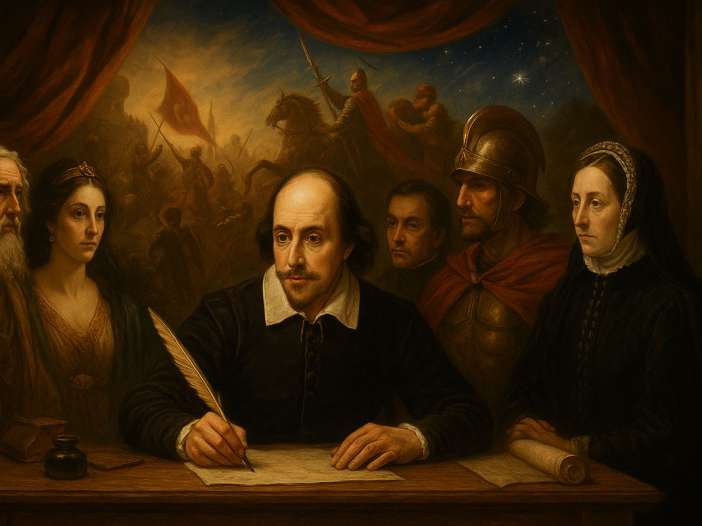
|
Getting your Trinity Audio player ready...
|
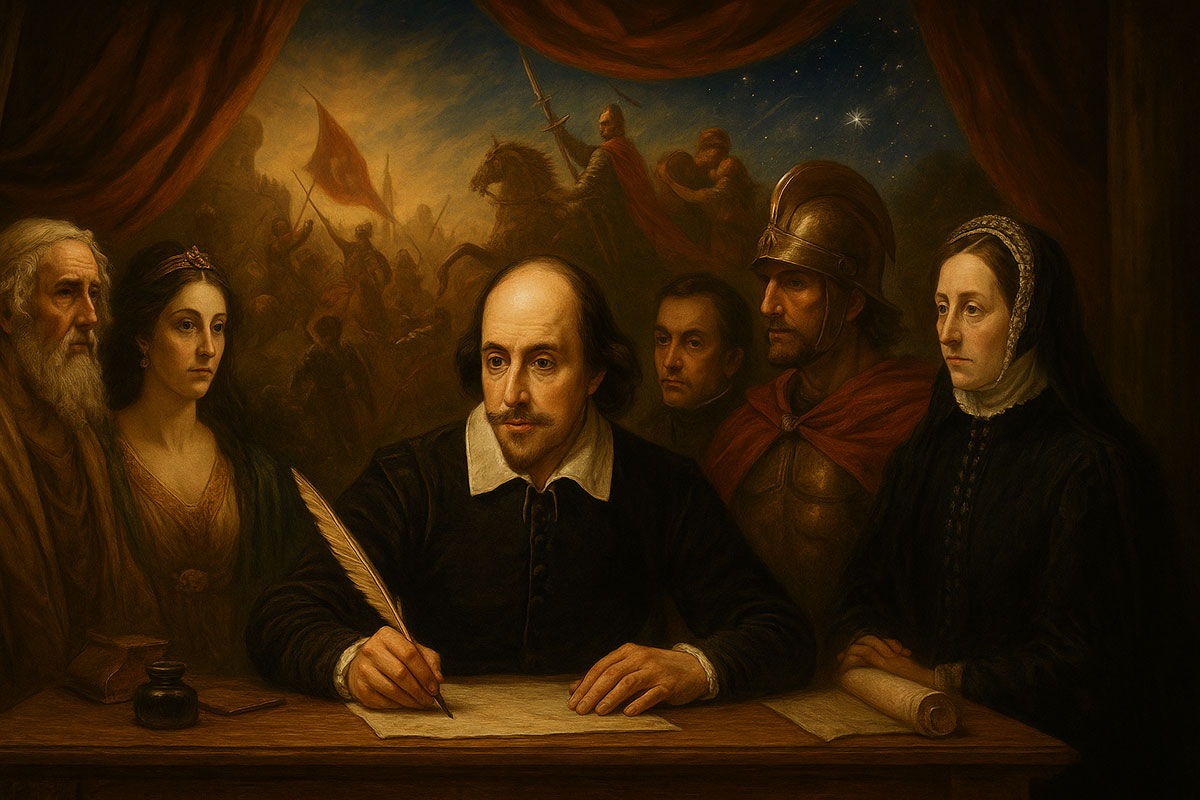
Introduction
Good friends of time to come, lend me your ears. Oft have I dreamt that a man may not be bounded by his thirty-nine plays, nor by the parchment that bore his hand. There are more worlds than those I writ, more empires to rise, more queens to fall, more stars to blaze.
In these ten new imaginings you shall find Constantinople’s walls crumbling, philosophers quilling wisdom beside their crowns, and Mary of Scots pacing her prison with love letters and regret. You shall hear Troy’s women wail louder than any trumpet, watch Cairo’s merchants weigh justice with coin and conscience, and see a sorcerer of Samarkand turn exile into metamorphosis. The Nile shall give her daughter to both throne and lover, Carthage shall burn while Rome ascends, Verona shall mourn and yet feast, and the heavens themselves shall stage their masque above us.
These are not the works I left behind, but the echoes I might have penned had fate granted me longer candle and steadier hand. Take them as visions, as whispers across time, that we may together imagine what might have been.
(Note: This is an imaginary conversation, a creative exploration of an idea, and not a real speech or event.)

1. The Conqueror of Constantinople
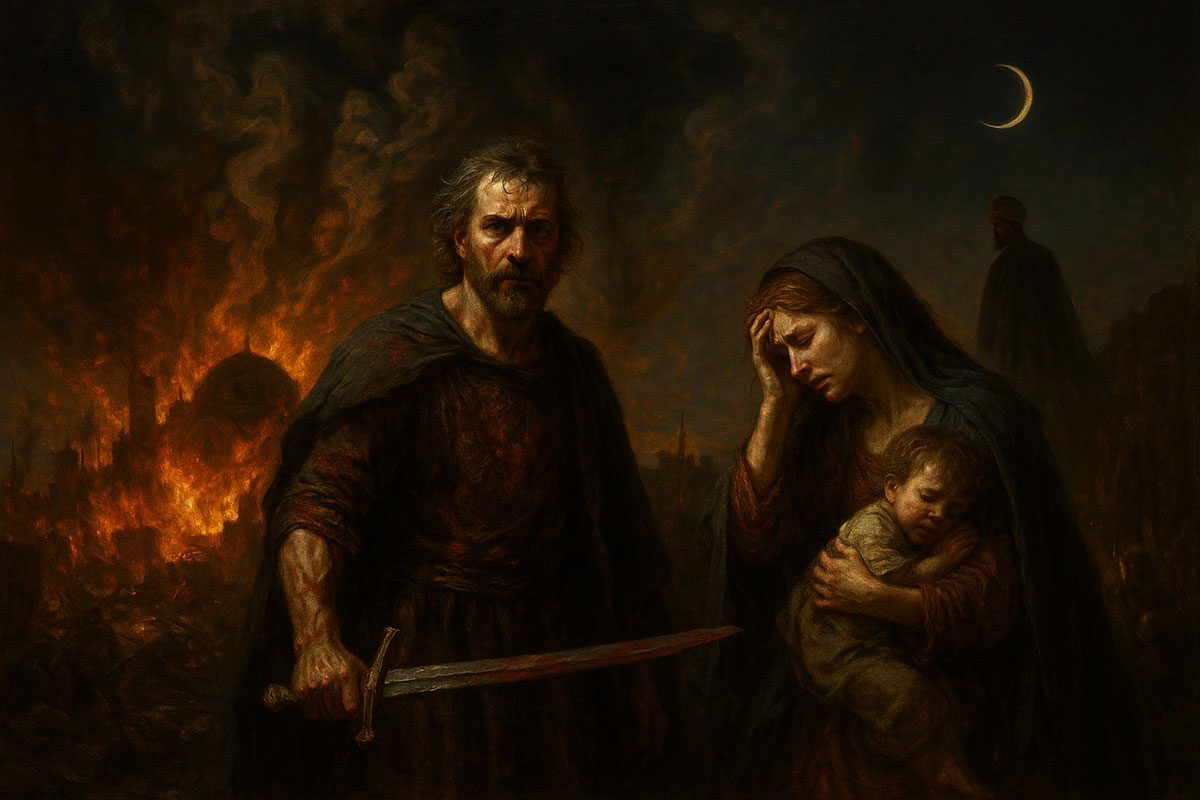
Moderator: William Shakespeare
Shakespeare — Good friends, we would fashion a play that outlives our bones. Lend me your wisdom. I’ll ask three questions only; answer plain and bold, that I may hammer drama from your metal.
Question the First
What truly fells an empire—corruption, betrayal, exhaustion of fortune, or the blind wheel of fate? And how do I keep the scale of history without losing the heartbeat of a single soul on stage?
Mehmed II — An empire falls when it forgets its morning drills. Gates rust not from storms but from neglect. I breached walls because watchmen argued stipends while masons patched with poor mortar. Show me not as thunder alone; show the ledger gone thin, the granary mouse-fat, the soldier unpaid. Keep your intimacy by following one janissary who must climb the ladder knowing his mother prays he returns with bread, not glory.
Edward Gibbon — Decay wears a velvet glove. Wealth breeds delicacy; delicacy dulls discipline. Your stage must display small relinquishments—taxes farmed to favorites, officers purchased, ceremonies lengthened while arsenals shorten. For the heartbeat: a clerk who changes one figure to please a superior, and thereby moves an army a week too late. In that quill-scratch, an empire trips.
Anna Komnene — Betrayal is a household lamp turned low. Show us the kitchen, not only the throne room. Let a mother counsel prudence while her son hawks honor for coin; let a cousin whisper that the empire is sick and needs harsh medicine—and that physician pockets the fee. The city did not fall in a night; she dozed for years. Put on stage a widow selling her last copper icon to buy bread the week before the siege; there, audience and empire share a pulse.
Christopher Marlowe — Give me sinew and smoke. Empires die when men with little dream larger than men with much. Your chorus can speak of fate, but your scene must show appetite. A hungry soldier is prophecy with a knife. For the intimate beat: a boy who maps the walls by tapping them at dusk—hollow, hollow—then pockets the chalk and stares at the moon, knowing he will be first up the ladder. His heartbeat is your drum.
Geoffrey of Monmouth — Kings fall as the stars declare, yet men hasten what the heavens only hint. Bind prophecy to private oath: a nurse recalls an old riddle that “stone shall fly like bird,” and later the cannon sings. Keep one relic upon the stage—a shard of saintly bone passed from hand to trembling hand—so when walls thunder, we still hear fingers pray.
Shakespeare — I hear it: rot in the pantry, thunder at the gate, the quiet quill that moves the map. A chorus for the wheel of fate, and a widow for the wheel’s cruel turn.
Question the Second
Faith and fanaticism: how may I show devotion that comforts and devotion that burns, yet keep charity for both the slain and the slayer?
Anna Komnene — Piety smells of incense and of smoke from the baker’s oven. Let the faithful bake bread for strangers as bells toll for battle. In the same square, let zeal shout louder than the bells. Stage a priest who blesses children and, in the next breath, begs the emperor to bar the gates to refugees. Charity and fear are twins; dress them in similar cloaks, so the audience must look twice.
Geoffrey of Monmouth — Set a prophecy before the people and watch how each faction bends it. The meek find comfort; the proud find warrant. A pilgrim’s hymn can be the very tune a zealot marches to. Give your slayer a mother who embroidered psalms into his childhood pillow. Then when he strikes, his hand trembles over the same words.
Mehmed II — Faith steadies the hand on the bowstring. Yet a commander must separate prayer from plan. Show an imam who urges courage and a captain who urges rations—and let both be right in their measure. Have a muezzin’s call float over the walls at dawn while, within, a nun presses a cool cloth to a fevered child of the opposite camp. Two devotions, one mercy.
Edward Gibbon — Fanaticism is thriftless; it spends men like coin and calls the ledger holy. Portray the magistrate who warns of dwindling powder but is silenced by those who prefer conviction to calculus. Still, let us not mock devotion. Civilization is held together by invisible vows. Show a shopkeeper who refuses to raise prices during siege because his conscience will not be taxed. That man is the empire the cannons cannot touch.
Christopher Marlowe — Put fire on stage: torches, candles, fuses. Let one light warm and another scorch. In language, make zeal swift and monosyllabic—cut, burn, cleanse—while mercy speaks in longer breaths. Then switch them for a scene, so the audience feels the ground tilt: a fanatic with a tender metaphor, a saint with a knife of logic. Pity blossoms in paradox.
Shakespeare — A bell that tolls for all, a hymn that arms a hand, a cool cloth laid on an enemy’s brow. We shall hold the mirror so both the penitent and the implacable see themselves.
Question the Third
Of the Conqueror himself: should I paint him villain, hero, or man complex and divided—and how shall memory, that stern editor, judge him when the curtain falls?
Christopher Marlowe — Give him the iron joy of impossible tasks. Let him speak in lines that dare the sun to rise faster, then show him alone, counting the cost in fingers that will not stop trembling. A hero who hears ghosts and bargains with them is better than a villain who sleeps sound. Make his triumph taste of ash.
Mehmed II — I am neither your devil nor your saint. I am an argument made flesh: youth impatient with caution, vision unamused by tradition. Put into my mouth the line, “I do not break oaths; I replace them.” Then show me feeding the poor from the city I have taken. If you will judge me, let it be by the laws I keep after victory, not the banners I plant.
Anna Komnene — Our city learned to sing two notes at once—lament and wonder. Give the conqueror a scholar’s curiosity; let him walk our libraries by lamplight and spare what he might have burned. Yet do not flatter him: place a widow in his path who asks where her husband lies, and let him falter. Empires meet in that hesitation.
Edward Gibbon — Posterity is a fickle juror. Today’s liberator is tomorrow’s usurper in print. Your epilogue should be an archivist sorting contradictory letters: one calls him Caesar restored, another, scourge of God. The conqueror becomes whatever footnote survives the fire. On stage, therefore, furnish competing testimonies and permit the audience to sit, for a heartbeat, in the historian’s chair.
Geoffrey of Monmouth — Weave legend through his footsteps. Let an old blind singer claim he dreamt this youth would dine beneath domes his ancestors only circled. Then, as the final scene dims, have children play at sieges with apple cores and sticks. Thus memory begins her work—half play, half prayer.
Shakespeare — So he shall walk in chiaroscuro: a prince who counts costs, a reader in a ravaged library, a name the scribes will quarrel over. The last light will fall on children at their game; the first line of history is always a lullaby misremembered.
Shakespeare — I have my metal: pantry and parchment, bell and blade, conqueror and widow. Next we’ll shape acts from these answers:
Rot and Ritual — the quiet betrayal of small comforts;
The Watch and the Widow — siege through a single household;
Torch and Thurible — devotion’s twin flames;
The Ladder — hunger climbing toward history;
Afterlight — library, ledger, lullaby.
2. The Philosopher King
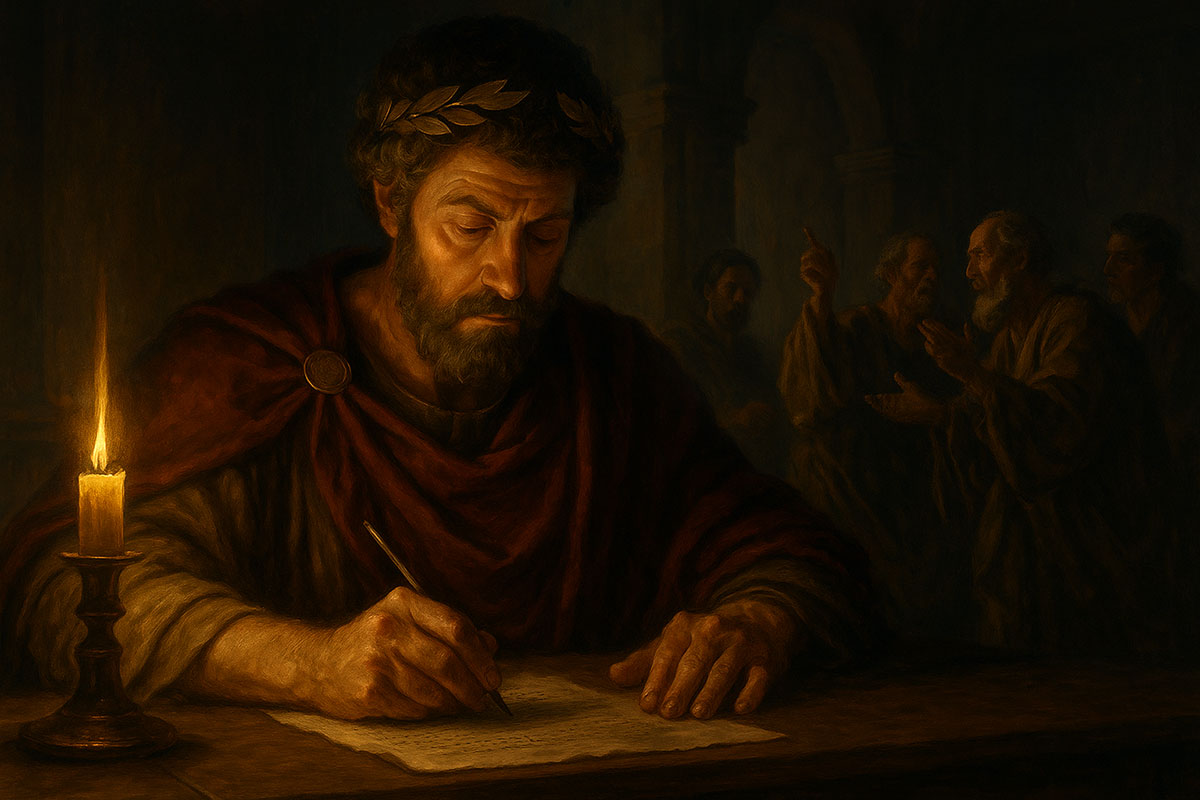
Moderator: William Shakespeare
Shakespeare — Noble thinkers, lend me counsel. I seek a play where crown and conscience wrestle. How shall I show a king whose sceptre weighs more than his philosophy, and yet who would leave behind wisdom that outlives empire?
Question the First
What is the true burden of a philosopher upon a throne: to rule wisely, or to endure the corruption of wisdom by power?
Marcus Aurelius — The burden is both. A ruler is not exempt from storms; he must sail the ship while reciting the principles that steady his own heart. Show a king writing meditations in candlelight, not to teach others but to keep himself from despair. Rule wisely if he can, endure when he must — this is the daily weight.
Montaigne — Philosophy grows awkward in a crown; it speaks softly where politics demands thunder. Yet therein lies drama: the hesitation of a thoughtful ruler is more perilous than the haste of a brute. Let your stage show the private mutterings of a king who would rather weigh an argument than a sword.
Seneca — Philosophy is armor, not escape. A ruler must not grow too delicate under its cloth, else sharper men stab him through it. Show him practicing temperance, but also show the crack — when his Stoic calm deserts him, the audience will see philosophy’s true test.
Thomas More — A king may speak truth to himself, yet the realm demands masks. Wisdom counsels patience, but justice sometimes calls for steel. Show a man torn between conscience and command, who writes one thing in prayer and signs its opposite in law.
Plutarch — Biography teaches that rulers are judged by deeds, not scrolls. A king may keep a philosopher’s heart, yet the people ask bread and victory. Set him in contrast: a general urging conquest, a scholar urging restraint. In his choice lies the measure of his soul.
Shakespeare — Aye, a king who scratches wisdom in secret yet must brandish steel in public. His torment will be my theatre.
Question the Second
Can virtue survive the intrigues of politics, or must it be broken, bent, and bartered?
Montaigne — Virtue is a reed, not an oak. Bend it and it lives; stiffen it and it snaps. On your stage, let virtue be tested in little bargains: a judge bribed with flattery, a friend excused from punishment. The small bends break the heart more than the grand betrayals.
Plutarch — In the lives of rulers, virtue is most radiant when surrounded by vice. Write a court of flatterers, each whispering gain, and place the king’s virtue in dialogue with temptation. If he falls, his fall is epic; if he holds, his greatness unmatched.
Thomas More — Virtue may survive, but not the man who holds it. I know this from the block. If your king clings to conscience, write the scaffold beside his throne. Yet such survival — truth held though the body falls — is worth more than crowns.
Seneca — Virtue survives when it becomes inward law, not outward display. Do not make the mistake of showing only grand gestures. Show restraint, mercy, silence. Let the audience see how the king holds his temper when insulted. That is philosophy triumphant.
Marcus Aurelius — The intrigue of politics is but another lesson for the soul. If virtue bends, it learns patience; if it breaks, it teaches the folly of pride. Give your king both failures and triumphs, for no emperor escapes mixture.
Shakespeare — So virtue survives as reed, as silence, as scaffold. I shall paint a ruler who bends, and in bending, reveals his very measure.
Question the Third
How shall I shape his legacy? Should the people remember him as ruler, thinker, or tragic man who could not reconcile the two?
Seneca — Legacy is smoke; it drifts where the wind pleases. Better to show the man striving than the world remembering. Let his final soliloquy be a meditation, not a proclamation. His tragedy is that he knows legacy lies beyond his grasp.
Thomas More — Yet legacy is the ink that outlives flesh. Show the people misjudging him, calling him weak where he was strong, foolish where he was faithful. Then, let posterity correct them in the play’s closing voice, as truth outlasts the scaffold.
Marcus Aurelius — I would have him leave words rather than monuments. Statues crumble; meditations endure. End your play with his writings read by another — perhaps a child or soldier — so that the audience sees how thought transcends throne.
Plutarch — Every life is twofold: the public and the private. Write the ending as double. The chorus proclaims him king, the confidant remembers him man. Between those two images lies his immortal portrait.
Montaigne — Tragic he must be, for no man wholly unites philosophy and power. The crown distorts thought, the pen weakens command. If you wish a masterpiece, end with irony: his reign forgotten, his meditations cherished. Thus man is preserved, king erased.
Shakespeare — Well spoken. Then I shall fashion a king whose crown weighs down his conscience, whose pen outlives his sceptre. The tragedy will not be in his rule, but in his solitude. His monument shall be words whispered long after the empire fades.

Candle and Crown — the private meditations of a ruler.
Court of Reeds — small bends of virtue under pressure.
Masks and Laws — conscience in conflict with command.
The Scaffold and the Silence — philosophy’s trial by politics.
Whispers of Posterity — writings read when throne lies empty.
3. The Queen of Scots

Moderator: William Shakespeare
Shakespeare — My quill aches to write of a queen undone by love, betrayal, and power. Speak, wise counselors: how shall I weave her tale so the stage shudders with both majesty and pity?
Question the First
Is betrayal the marrow of Mary’s tragedy, or do her own choices steer her downfall? How shall I balance guilt with fate?
Mary, Queen of Scots — Betrayal was my shadow. Husbands, counselors, even kin wrapped daggers in their words. Yet I was not without fault: my heart leapt quicker than my crown. Show me not as saint nor fool, but as woman and queen — my love letters as binding as any treaty.
William Cecil — She was architect of her ruin. Impulse and poor judgment left England little choice but chains. Do not flatter her with too much fate. Give her the stage as a queen who knew the stakes yet played recklessly. The tragedy is not that she was betrayed, but that she betrayed herself.
George Buchanan — History teaches: Mary’s charms blinded reason. She yielded too often to passion. But in drama, passion is the furnace. Let her downfall be both chosen and imposed — a flame she fed and a wind that fanned it.
John Knox — Betrayal? Nay, it was judgment. A woman was not fit for such throne. Show her weakness plain: a ruler ruled by flesh, not spirit. Her tragedy is that she dared wear the crown while captive to desire.
Raphael Holinshed — Chronicles bear witness to both: betrayals from lords and frailties of the queen. Best to show the contradictions side by side — a queen betrayed, yet complicit; a woman wronged, yet reckless. Thus will the audience feel pity and fear alike.
Shakespeare — Then she shall walk the stage not as angel nor fiend, but as woman who both steered and was steered. Betrayal and choice shall be her twin ropes.
Question the Second
How shall I show love and power twined together — are they balm or poison to a ruler’s soul?
George Buchanan — For Mary, love was venom dressed as balm. Her marriages chained crown to heart, and both broke. Show the stage littered with letters and petitions, each sealed with both kiss and command.
Mary, Queen of Scots — Love was my refuge. Without it, the crown was cold iron. If you write me without love, you write me half dead. Let the audience see how power stripped me, yet love clothed me. Poison, yes — but I drank willingly.
William Cecil — For rulers, love is a liability. Passion bends judgment. Portray love as theater itself — courtiers watching, whispering, twisting her affections into weapons.
John Knox — Love is no balm for a queen. It is a snare. Her downfall lay in yielding to men rather than yielding to God. Let her love stories be shown as idols fallen.
Raphael Holinshed — Set love and power as rival suitors. One pulls the heart, the other the crown. She chose love too often; the realm demanded power. That discord is the marrow of tragedy.
Shakespeare — Aye, then love shall be played as both refuge and snare — warm as candlelight, fatal as poison.
Question the Third
When curtain falls, how shall memory keep her? Martyr, sinner, queen, or woman undone?
John Knox — Let memory show her rightly: a warning, not a martyr. A queen who mixed weakness with authority breeds ruin. Let her be a lesson.
Mary, Queen of Scots — No, let me be seen as I was: a woman of flesh, who dared to love and rule at once. If they call me sinner, so be it, but sinner in passion, not in treason.
William Cecil — Posterity weighs on scales of state. England’s peace demanded her fall. Show her end not as cruel whim, but as necessity. A queen undone, not by fate alone, but by the safeguard of nations.
Raphael Holinshed — The chronicles will argue forever. Better to end your play with voices conflicting — some cry “martyr,” others “fool.” The audience, like history, must choose.
George Buchanan — Legacy is paradox. Paint her in chiaroscuro: radiant yet reckless, beloved yet betrayed. Thus she will live on stage as she lives in our pages — disputed, dangerous, unforgettable.
Shakespeare — So she shall not die alone, but surrounded by voices that quarrel even after the axe falls. Memory itself will be my chorus.

Letters and Daggers — betrayal and choice entwined.
Crown of Flesh — love’s double-edged gift.
Court of Shadows — whispers that twist affection into politics.
Chains of Conscience — imprisonment of body and heart.
The Chorus of Memory — martyr, sinner, queen, and woman all in one.
4. The Siege of Troy
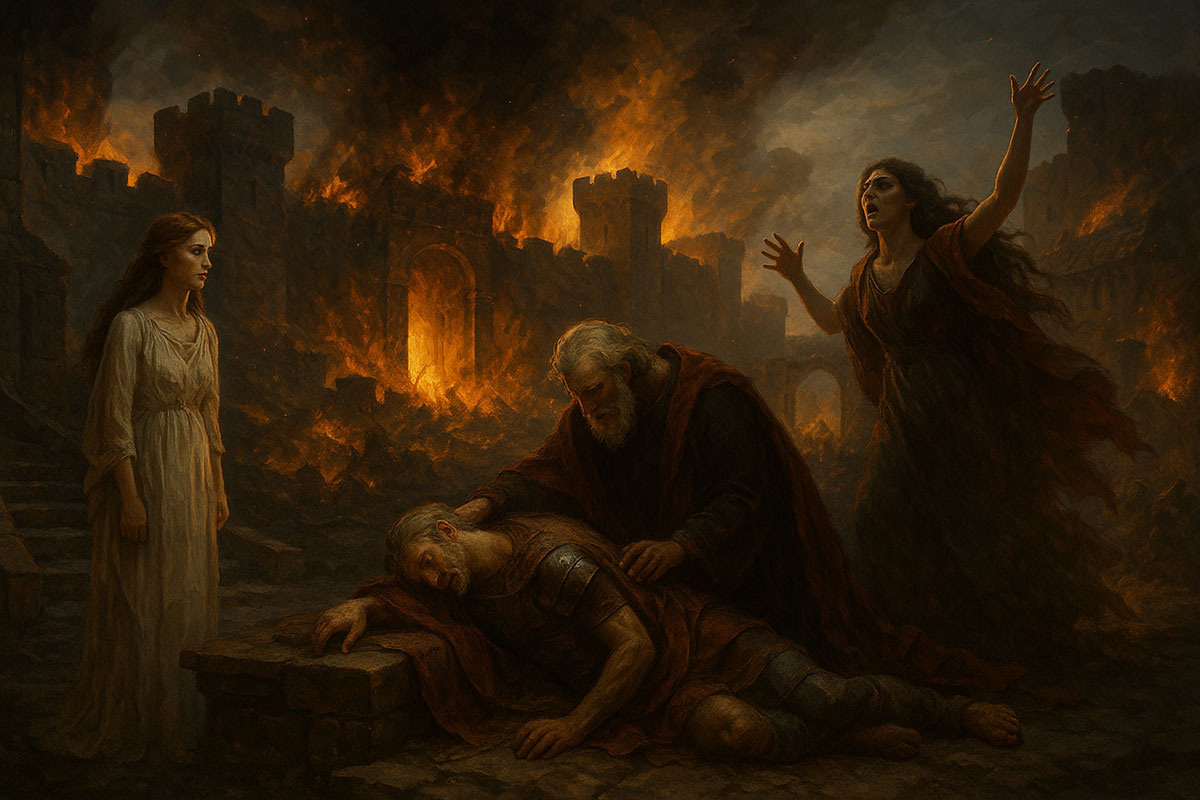
Moderator: William Shakespeare
Shakespeare — Gentle poets and tragedians, I would fashion Troy anew. Our boards shall groan with spears and sighs, yet the tale must speak beyond war. Lend me counsel: how to pen a siege that is both thunder in the walls and whisper in the heart?
Question the First
Is war at Troy glory or waste, and how do I render its blood so that pity outweighs spectacle?
Homer — War is both. Glory flames in the shout of Achilles, yet waste weeps in the eyes of Priam. If you would strike pity, show the fathers. Not the clash of bronze, but the hands of men who beg for their sons’ bodies.
Chaucer — Waste, aye, and folly too. The courtly game of Troilus and Criseyde shows love bleeding beneath war’s pomp. On stage, make your warriors distracted by longing, make your generals undone by desire. Thus the war becomes not a tale of nations, but of hearts undone.
Virgil — War is destiny’s hand. To Rome, Troy’s waste was seed. Portray the flames not as end but as sowing. One audience will mourn, another will foresee empire. Show the waste in bodies, the glory in what grows from ashes.
Euripides — Waste alone. The chorus of women wailing tells more truth than a thousand shields. If you wish pity, let women and children speak, let them curse gods and kings alike. Leave the glory to flatterers.
George Chapman — Yet glory kindles men’s souls! I translated Homer to give breath to that fire. Still, Shakespeare, temper it: pair glory with grief, let the same sword win renown and orphan a child in the same breath. Thus the boards hold both triumph and tears.
Shakespeare — Then I must twin trumpet with lament: the father who kneels for his son, the widow who curses the gods. Glory that burns to waste, waste that seeds glory.
Question the Second
Helen, cause of quarrel: shall I write her victim of fate, or agent of desire?
Euripides — Victim, always. Men made her emblem of strife. In my play Helen, she is innocent, blamed unjustly for men’s wars. So let her speak, let her defend herself, so the audience hears the cruelty of myth.
Homer — I sang her beauty, aye, but also her sorrow. She knew her part in ruin, yet wept for it. Let her be both guilty and grieving — the weaver of fate who loathes the pattern.
Chaucer — Love is no puppet. Make her agent, for desire has teeth. The game of passion sets kingdoms aflame as surely as ambition. Let Helen speak boldly of longing, and the play will sting sharper.
Virgil — Agent or victim, both serve destiny. It is not Helen who burns Troy but fate itself. Yet her image must haunt the stage — whether she wills or not, her beauty becomes empire’s funeral torch.
George Chapman — Better she be both flame and ash. A victim’s lament grows weary; an agent’s boldness stirs the pit. Let her stride with guilt in her eyes and desire in her breast. She shall be the most tragic, for she knows she is both.
Shakespeare — Then Helen shall walk two masks at once: desiring and despised, guilty and grieving. Her beauty the spark, her sorrow the smoke.
Question the Third
When the curtain falls, what voice must close the play — the warrior’s boast, the widow’s lament, or the prophet’s riddle?
Virgil — The prophet, surely. For Troy’s fall is not an end but the beginning of Rome. A riddle of destiny must hang in the air, so the audience feels the torch passed forward.
Euripides — Nay, the widow. War belongs to women who bury. End with their voices; let their cries drown the boast of men. Only then does tragedy bite.
Homer — Give both. End with Priam’s plea for his son’s body. A father’s voice silences both prophets and boasts. Pity shall be your final arrow.
Chaucer — Or end in irony: lovers whispering promises even as walls crumble. A gentle close, a broken vow. The audience will feel the wound linger longer than any prophecy.
George Chapman — I say, let all three speak. A chorus: warrior, widow, prophet. Their voices braided, so the play closes as life does — with boast, lament, and riddle together.
Shakespeare — A chorus, yes — the voices of all: warrior’s pride, widow’s grief, prophet’s shadow. Thus the curtain falls with discord that is truth.

Trumpet and Lament — fathers and sons amidst the clash.
Flame of Desire — Helen between agency and fate.
Chorus of Women — grief louder than bronze.
Destiny’s Ashes — Troy burning, Rome stirring.
Threefold Voice — boast, lament, and prophecy entwined.
5. The Merchant of Cairo
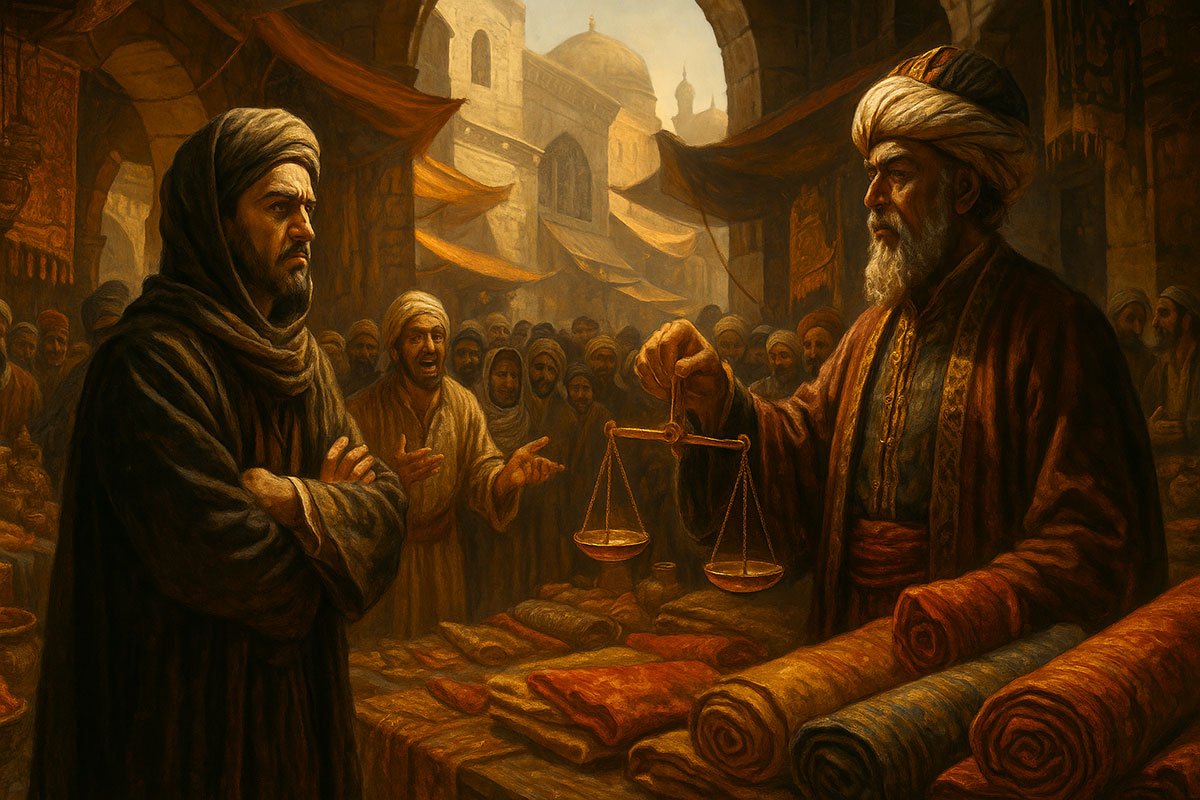
Moderator: William Shakespeare
Shakespeare — Merchants and travelers, chroniclers of law and fate, I would set my stage in Cairo — a city where gold weighs as heavy as faith, and justice is measured in both coin and conscience. Lend me counsel, that I may craft a play where markets and morality wrestle in equal measure.
Question the First
When trade crosses borders, whose law commands — the merchant’s homeland, the host city, or the invisible law of exchange itself?
Ibn Khaldun — Trade is a rope between strangers. Laws of coin and contract form only one strand; custom and honor bind the rest. Show a merchant who clings to foreign law, only to find that Cairo’s market mocks him. Let him learn that exchange itself is the greater law, older than kingdoms.
Marco Polo — In my travels, I found that every port boasts its own rule, yet all are bound by trust. A Venetian and a Persian may bargain without words if their eyes speak true. Place on stage two merchants, unable to share a tongue, yet by gestures conclude a deal truer than any parchment.
Herodotus — Peoples differ, but all love gain. Portray the host city as a judge: Cairo’s courts command within her walls, yet the Nile flows beyond kings. Let the stage show the conflict of civic law against the river’s wider commerce.
Leo Africanus — In Africa, trade is kinship. A host’s table is as binding as a court. Let your play hold scenes of banquets and bazaars, where a man’s honor is coin more weighty than silver.
William Camden — Yet do not forget the crown. In England, merchant law bends to royal seal. Portray a monarch’s edict reaching across seas, colliding with Cairo’s judges. In that clash lies drama.
Shakespeare — Then law shall be a three-headed beast: parchment, custom, and crown. The play will ask which head bites hardest.
Question the Second
Prejudice: can a stranger ever belong in a foreign market, or will suspicion forever shadow his scales?
Leo Africanus — Suspicion is the stranger’s cloak; he cannot shed it, yet he may adorn it with generosity. Let a foreigner prove himself by overpaying, by gifting, by weaving into the host’s rituals. On stage, show him mocked first, welcomed last.
Herodotus — All nations call others barbarian until coin changes hands. Prejudice fades when profit speaks louder than pride. Show the merchant sneered at in words, yet embraced in trade.
Marco Polo — I have walked markets where I was both guest and curiosity. Let the stage show wonder: children chasing the stranger, women marveling at his garb. Suspicion mingles with fascination — a comedy as much as a burden.
Ibn Khaldun — Belonging requires generations. One merchant may profit, but his grandson belongs. Portray the stranger as planting seed in soil not yet his own. The audience must feel the slow grind of time.
William Camden — True belonging comes when the stranger bends tongue and coin alike. Language is the door, custom the key. Without both, suspicion stands eternal.
Shakespeare — Aye, then the foreigner shall walk the stage between scorn and embrace, suspicion and curiosity, until the audience sees that trade itself is the bridge.
Question the Third
Justice and mercy: when contract is broken, should the law demand its pound of flesh, or should mercy soften the scales?
Herodotus — In Egypt, law is ancient and stern, yet priests temper verdict with ritual. Portray a court that demands strict penalty, yet an elder voice cries for balance.
Ibn Khaldun — Justice is glue of society; mercy its fragrance. Without justice, commerce rots. Without mercy, men rebel. Show a judge weighing two ledgers — one of coin, one of conscience.
Marco Polo — I have seen emperors pardon debts to win loyalty. Mercy may profit more than punishment. A merchant spared may bring greater tribute tomorrow. On stage, let the audience feel the irony: forgiveness as the shrewder bargain.
Leo Africanus — Mercy elevates the giver. In Cairo, a merchant who forgives gains honor beyond gold. Yet forgiveness must be public, so all know the weight of his choice.
William Camden — The law is the crown’s shadow. Mercy may shine, but if it weakens authority, the market collapses. Portray a ruler torn: his mercy risks precedent, his justice risks rebellion.
Shakespeare — So the climax must be a trial: ledgers and hearts weighed together. Justice, mercy, profit, and honor — all balanced on a merchant’s scale.

The Market of Tongues — law of coin, custom, and crown collide.
The Stranger’s Cloak — prejudice and curiosity mingle.
The Banquet Bargain — kinship forged across suspicion.
The Court of Scales — justice demands flesh, mercy demands grace.
The Ledger of Legacy — forgiveness reshapes both market and memory.
6. The Sorcerer of Samarkand

Moderator: William Shakespeare
Shakespeare — Good sirs, I would conjure a play where power wears robes of both empire and illusion. A sorcerer in exile, a city of domes and minarets, truth mingled with deception. Tell me: how shall I build this fable, that men see themselves in its mirror?
Question the First
Magic — is it wisdom unveiled, or illusion deceiving? How shall I stage it so that it teaches and not merely dazzles?
Ovid — Magic is metamorphosis — not trickery but change of heart. Show men who believe they see transformations outside, but whose souls alter within. A man may think he watches stone turn to bird, but the true spell is his own envy revealed.
John Dee — Magic is mathematics clothed in symbol. It unveils what is hidden. Show your sorcerer with compasses, charts, and cryptic alphabets. The stage can dazzle with apparitions, but let the deeper wonder be order beneath chaos.
Rumi — Magic is the heart’s unveiling. Show a man who conjures visions only to discover he summons his own longing. The true illusion is separateness; the true spell is union. Let your sorcerer’s art draw strangers together.
Avicenna — Knowledge may look like sorcery to the unlearned. Show the physician who heals with herbs and geometry, and the people call him wizard. Your play must blur science and sorcery, so the audience wonders what wisdom really is.
Timur — Magic is power, nothing else. Use it to bend knees, break cities, inspire fear. A sorcerer who cannot command men is no better than a beggar with baubles. Show him using wonders to seize thrones.
Shakespeare — Then magic shall be both mask and mirror: a tool for fear, a veil for wisdom, a lantern that reveals the heart beneath illusion.
Question the Second
Exile — how does banishment shape a man who once held power? Is exile ruin, or is it rebirth?
Rumi — Exile is the wound that lets light enter. In leaving homeland, the soul remembers its true home. Show the sorcerer weeping first, then laughing at his own tears, for exile has given him new eyes.
Timur — Exile is shame. To be cast out is worse than death for rulers. Show him pacing, plotting revenge, gathering loyal few to carve a new empire. His rebirth is forged in blood.
Avicenna — Exile sharpens the intellect. A man without court learns to trust reason. Portray him in solitude, writing, discovering truths that empires never taught him. Exile becomes his academy.
John Dee — Exile is the alchemist’s furnace. Remove base comforts, and the soul refines into gold. A man without homeland may discover the universal homeland of mind.
Ovid — I know exile’s taste. It is salt, bitter and endless. Yet in Tomis I wrote verses that outlived Rome’s favor. Show the sorcerer finding immortality not in throne, but in tale.
Shakespeare — Then exile shall be both furnace and tomb — where a man may rise refined or rot forgotten. My stage will weigh both fates.
Question the Third
Power — is mastery over men greater, or mastery over oneself? How shall I end: with conquest, with forgiveness, or with transformation?
Avicenna — Mastery of self. To govern passion is higher than governing provinces. Let the sorcerer choose restraint when empire tempts him. That is nobler conquest.
Timur — Empire alone gives legacy. Who remembers hermits? Men carve their names on stone through cities, not meditations. End him crowned, or end him crushed, but let him thirst for dominion.
Rumi — The self is the only kingdom. To forgive is to reign. Let your final act show him turning enemies into companions, choosing union over power. That ending will shine.
John Dee — Transformation is the only true magic. The play must close with the sorcerer changed — not merely in robes, but in spirit. Whether he holds crown or not, the audience must see he is no longer the man he was.
Ovid — Both empire and self dissolve, as flesh to myth. The true ending is metamorphosis — man into legend. Let him vanish, leaving only stories. That is immortality.
Shakespeare — So the last scene shall shimmer: perhaps a throne, perhaps a vanishing, but surely a transformation. The sorcerer’s crown shall not be of gold, but of story itself.

The Veil of Wonders — sorcery as both wisdom and deception.
The Banishment — exile as furnace, shame, and rebirth.
The Ledger of Power — fear and loyalty, throne and scroll.
The Mirror of the Heart — illusion revealing truth within.
The Metamorphosis — transformation beyond empire.
7. The Daughter of the Nile
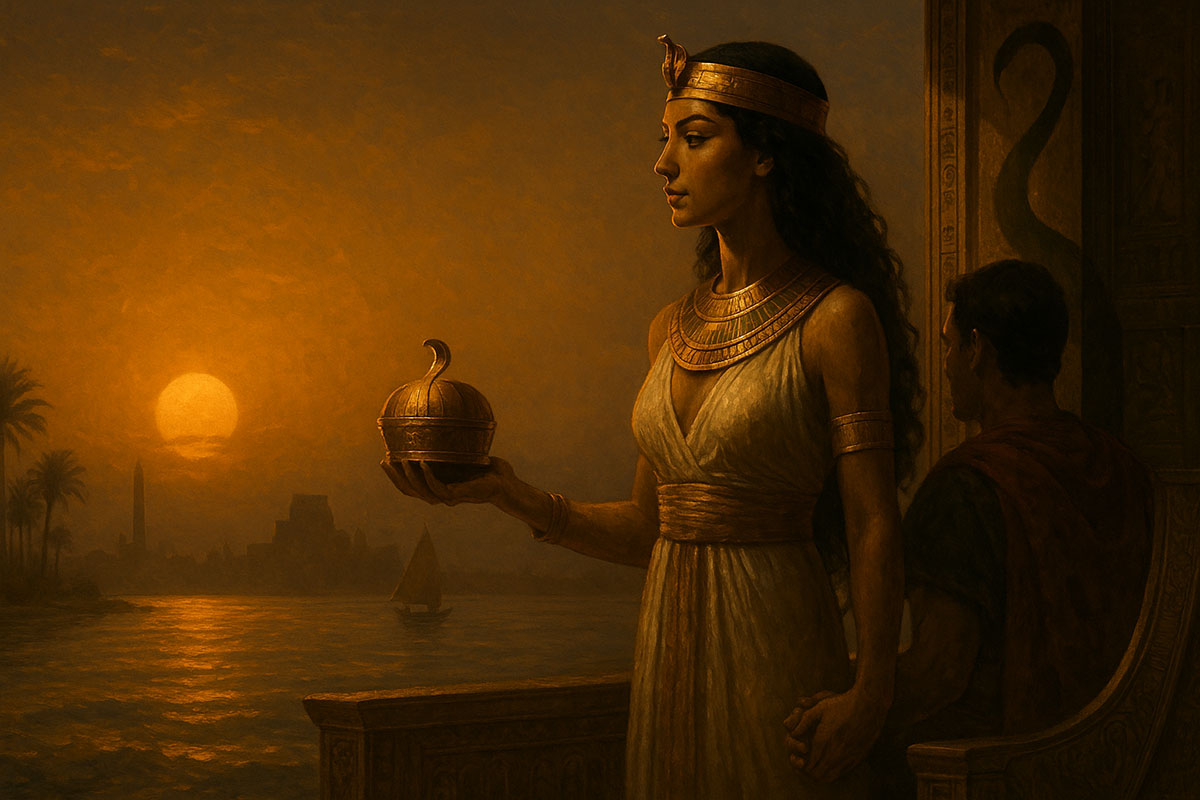
Moderator: William Shakespeare
Shakespeare — Fair chroniclers and sovereign, I would craft a play of Egypt’s daughter, where duty wrestles with desire, and destiny weds empire. Lend me your wisdom: how may I shape this tale so both throne and heart bleed upon the stage?
Question the First
Duty and desire — when a queen must choose, is love her ruin, or can it be her crown?
Cleopatra — Love is no weakness. It is the fire that gives a queen her sway. Men remember not only my throne, but my passion. Show her choosing love, and let that love burn so fierce that even ruin feels like triumph.
Plutarch — Love makes rulers mortal. In my Lives, I wrote of Antony and Cleopatra, undone by desire. A queen who places passion above politics is doomed. Portray her downfall as warning: the crown must always weigh more than the kiss.
Boccaccio — Desire makes story immortal. Lovers outlive kings in memory. Let your queen’s desire ennoble her, not weaken her — so the audience sees grandeur in her fall.
Herodotus — Egypt is duty carved in stone. Pharaohs bind themselves to gods, not lovers. Show the priests whispering, the people watching — a queen’s choice of love over duty is rebellion against her very land.
Apuleius — Love is divine metamorphosis. It can crown as well as ruin. Portray her passion as a spell — not only over her lover, but over destiny itself. Desire can lift her into legend.
Shakespeare — Then she shall walk the stage as both sovereign and lover, crowned and consumed by the same flame.
Question the Second
Destiny — does a queen rule her fate, or is she merely a jewel set in history’s crown?
Herodotus — No queen escapes destiny. Egypt swallows even her kings. The Nile’s flood decides more than any throne. Show her as a figure swept by the river of history.
Cleopatra — I ruled my fate. I chose lovers, I chose battles, I chose death. If men call it destiny, let them — but I named my own end. Portray her as mistress of choice, not victim of time.
Plutarch — She thought she ruled destiny, yet Rome ruled her. Better to show the irony: her will strong, her empire weak. The tragedy lies in her believing she steered the ship while storms steered her.
Apuleius — Destiny is but another name for transformation. Show her as a soul moving toward divinity. Her choices are threads, but the pattern is greater — a tapestry we glimpse only in the last act.
Boccaccio — Let destiny and choice dance. A queen believes she commands, yet the audience sees the net drawing close. That tension will pierce the heart.
Shakespeare — Aye, then I shall show her as both mistress and captive: a woman steering, yet already caught in history’s tide.
Question the Third
How shall her memory endure? As temptress, sovereign, martyr, or legend?
Plutarch — Temptress. Her allure undid Antony and endangered nations. Show her beauty as weapon — admired, feared, and fated to consume.
Cleopatra — Sovereign. I was no mere siren; I ruled with cunning and ceremony. Let history lie if it must, but on your stage show me queen first, lover second.
Herodotus — Martyr, perhaps — for Egypt itself. Her fall marked the end of pharaohs. Show her dying not as a woman undone, but as the last guardian of a kingdom.
Boccaccio — Legend above all. The people love tales greater than truth. Let her be many things at once: queen, lover, martyr, temptress. That is why she endures in memory.
Apuleius — Make her myth. Let her death be metamorphosis — the asp’s bite not an end but a gateway. In legend, she ascends beyond flesh into eternal symbol.
Shakespeare — Then so it shall be. She shall die as many women in one: temptress, sovereign, martyr, and legend — the asp her crown, her memory her empire.

The Kiss and the Crown — love and duty in collision.
The Nile’s Tide — destiny stronger than will.
The Priest and the Lover — Egypt’s gods against passion’s fire.
The Asp’s Choice — sovereignty in death.
The Legend’s Birth — Cleopatra reborn in memory, many in one.
8. The Fall of Carthage
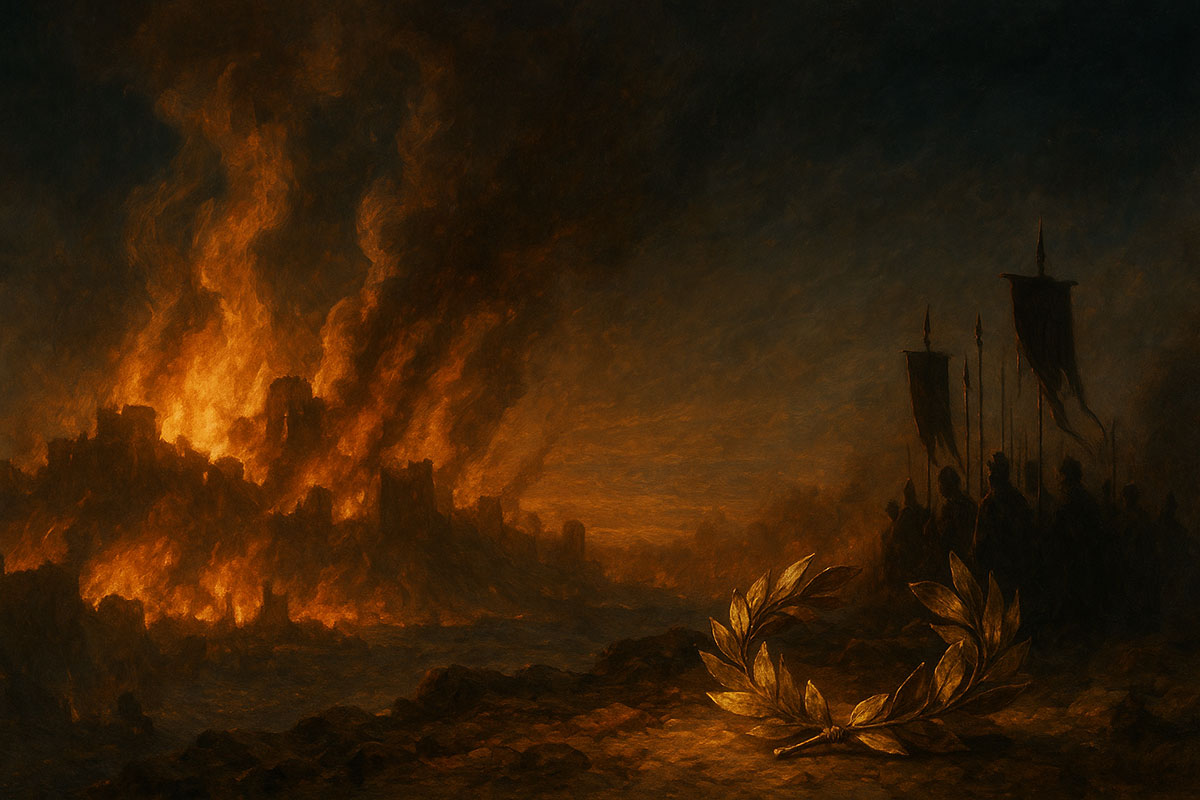
Moderator: William Shakespeare
Shakespeare — Great minds and warriors, I would put Carthage on my stage, her fires licking the sky, her pride ground beneath Roman sandals. Speak, so I may pen not only ruin of a city, but the ruin within man himself.
Question the First
Was Carthage undone by Roman might, or by her own pride and betrayal within? How should I stage the true cause of her fall?
Polybius — Rome’s might was iron discipline, aye, but Carthage’s weakness lay in her own factions. Councils bickered, generals quarreled, citizens sought profit over duty. Show on stage not just Roman swords, but Carthaginian tongues that cut deeper than steel.
Livy — Rome triumphed through virtue — order, loyalty, sacrifice. Carthage’s luxury bred weakness. Depict a banquet in Carthage, silk and gold aplenty, while Rome’s soldiers eat barley and sharpen blades. The contrast itself explains her fall.
Hannibal — Do not flatter Rome overmuch. Carthage bled me white with neglect. I gave them victory at Cannae, but my city abandoned me. Betrayal within — that was our undoing. Show me not defeated by Rome, but by my own council’s cowardice.
Machiavelli — Empires fall when leaders fear boldness. Carthage failed because her rulers hesitated. Rome struck with cruelty when cruelty was useful. Teach your audience this lesson: better to be feared than loved, if one cannot be both.
Virgil — Yet do not forget fate. In the Aeneid, Carthage must fall, for Rome must rise. Dido’s love for Aeneas is the seed of that enmity. Your stage must show not only politics, but destiny — the gods decreeing that Carthage be Rome’s sacrifice.
Shakespeare — Then Carthage shall die of many wounds: betrayal, luxury, hesitation, and fate’s unyielding decree.
Question the Second
Revenge and pride — Hannibal’s march against Rome, was it noble resistance or poisoned ambition?
Hannibal — Noble! I swore vengeance for my father and my people. I crossed the Alps not for glory, but for justice. Let the stage show a man of iron will, wronged and relentless.
Livy — Noble, perhaps, but poisoned too. Pride led him to chase Rome itself when he might have crushed her allies. Show him as tragic — great in courage, yet blinded by ambition.
Polybius — His march was genius, but genius without support cannot endure. Portray him as noble general abandoned by selfish politicians. Thus pity will mingle with awe.
Machiavelli — Hannibal was bold but not cruel enough. Rome survived because he spared too much. Had he been truly ruthless, history would be different. Make him a figure torn between nature and necessity.
Virgil — Pride is the fuel of tragedy. Let Hannibal be both noble and doomed, his very grandeur feeding the fire that consumes Carthage.
Shakespeare — Aye, then Hannibal shall stride the stage as lion and lamb: noble in oath, poisoned in pride, tragic in restraint.
Question the Third
When curtain falls, should the audience weep for Carthage as victim, or cheer Rome as destiny fulfilled?
Virgil — Cheer Rome. The gods demanded her rise. Show the ashes of Carthage as altar-fire for Rome’s greatness.
Hannibal — Weep for Carthage! Rome’s glory was my people’s grave. Show mothers with empty arms, fields salted, ships burned. If your audience cheers, let them cheer through tears.
Polybius — Let them see both. I chronicled history, not to praise, but to warn. The audience must feel admiration for Rome’s order, yet sorrow for Carthage’s ruin. Tragedy lies in dual vision.
Machiavelli — Teach them fear. Show Rome’s victory not as destiny, but as lesson: the strong devour the weak. Let your audience leave knowing only vigilance preserves nations.
Livy — Weep, yes, but also respect. Rome endured because she held discipline when others faltered. Make Carthage pitiful, but Rome exemplary.
Shakespeare — Then the play shall close with double voice: lament for Carthage, laurel for Rome. Ashes and triumph sharing one stage.

The Banquet and the Barracks — Carthage’s luxury vs. Rome’s discipline.
The Vow of Hannibal — revenge sworn and fate sealed.
The Betrayal of Councils — Carthage undone from within.
The Lion’s March — genius and pride upon the Alps.
Ashes and Laurel — Carthage burned, Rome rising.
9. The Lovers of Verona
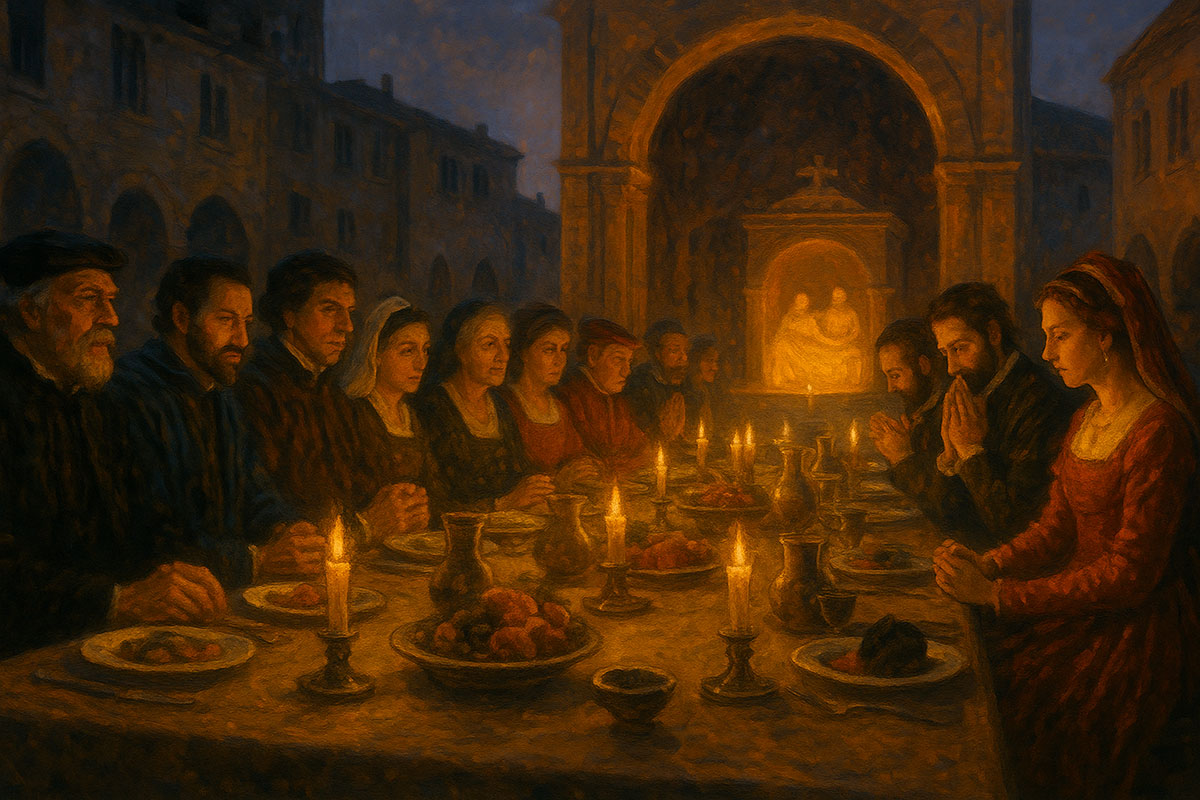
Moderator: William Shakespeare
Shakespeare — Gentle poets, priest, and fellow penman, I would return to Verona after the tomb is sealed. Not to rewrite the lovers’ end, but to ask: what comes after such grief? How may a city, a family, even memory itself endure?
Question the First
Grief — how do families endure loss so deep, and how should I shape the stage so sorrow breathes beyond mere lamentation?
Dante Alighieri — Grief is descent into hell, but also ladder upward. Show the families wandering in their own Inferno: pride, rage, despair. Yet let one figure glimpse a Purgatorio — a slow ascent through sorrow toward reconciliation. Thus grief becomes pilgrimage.
Petrarch — Grief is an echo that never fades. Write scenes where the Montagues and Capulets speak ordinary words but stumble, for every phrase recalls the lost children. Let grief haunt the air like a constant rhyme.
Boccaccio — Grief turns to story. In time, people recount even tragedy at banquets. Show servants whispering the tale, lovers in distant towns repeating it. In this way, grief becomes legend, shared and reshaped.
St. Augustine — Grief must bend toward God. Show the fathers railing, but end them kneeling. The heart restless in sorrow will find no rest until it rests in forgiveness. Without divine solace, grief corrodes.
Ben Jonson — Make grief sharp and unsentimental. Too many tears drown drama. Give us bitter wit: a Capulet who mocks his own lineage at a funeral, a Montague who curses his wine. Pain wears many masks — laughter among them.
Shakespeare — Then grief shall not only weep, but bite, mock, kneel, and echo. A whole city mourning in many tongues.
Question the Second
Reconciliation — can hate truly turn to peace, or will old grudges always creep back like weeds?
Petrarch — Hatred fades slower than love. Show reconciliation fragile as spring blossom, threatened by every cold wind. Lovers may die in a night, but enemies wither only over years.
Dante Alighieri — Peace is possible only when penance is walked. Show the families exchanging burdens: a Montague burying a Capulet child, a Capulet repairing Montague’s home. In the act of carrying one another’s sorrow, hate is cleansed.
Ben Jonson — Bah! Reconciliation is never pure. Make it comic and bitter — Capulets and Montagues shaking hands while plotting business advantages. Such crooked peace will please your pit and prick the nobles.
Boccaccio — Reconciliation is a feast. Show tables joined, bread broken, songs mingled. In laughter and story, enmity dissolves. But let one guest whisper poison, to remind the audience peace is always perilous.
St. Augustine — Only forgiveness from the heart transforms hate. Write a priest urging both houses to forgive as they hope to be forgiven. Without such grace, weeds will grow again, and peace will rot.
Shakespeare — Then peace shall be banquet and burden, comic and divine, fragile yet sought. A weeded garden where forgiveness may bloom.
Question the Third
Legacy — what remains of Romeo and Juliet? Do they live as warning, as inspiration, or as fading memory?
Boccaccio — They become tale. Lovers in distant cities will act their parts, sigh their sighs. Their story spreads faster than rumor, enduring as warning and wonder alike.
Petrarch — They are inspiration. Their sonnets of love unwritten still echo in others’ mouths. The play should end with a poet composing verses from their tragedy.
Ben Jonson — Bah, let them be warning. Fools who ran too fast into passion. Use their memory to mock impetuous youth. Your audience loves sharp tongues more than soft sighs.
St. Augustine — Their memory must be prayer. Their deaths call families to repentance, and the city to humility. End with their tomb a chapel, where hate bows to love divine.
Dante Alighieri — They are both warning and ladder. Lovers fall, yet their fall lifts others toward peace. End with a vision — Verona glimpsed in heaven’s light, reconciled through their sacrifice.
Shakespeare — So they shall endure as tale, warning, inspiration, prayer, and ladder. Their tomb shall be stage’s final light, both wound and healing.

The Tomb’s Echo — grief as descent, echo, and wit.
The Fragile Blossom — reconciliation sought, fragile, comic, and divine.
The Banquet of Burdens — families bearing one another’s sorrow.
The Whisper of Weeds — peace threatened, fragile as spring.
The Eternal Lovers — Romeo and Juliet reborn as warning, tale, prayer, and inspiration.
10. The Masque of the Stars
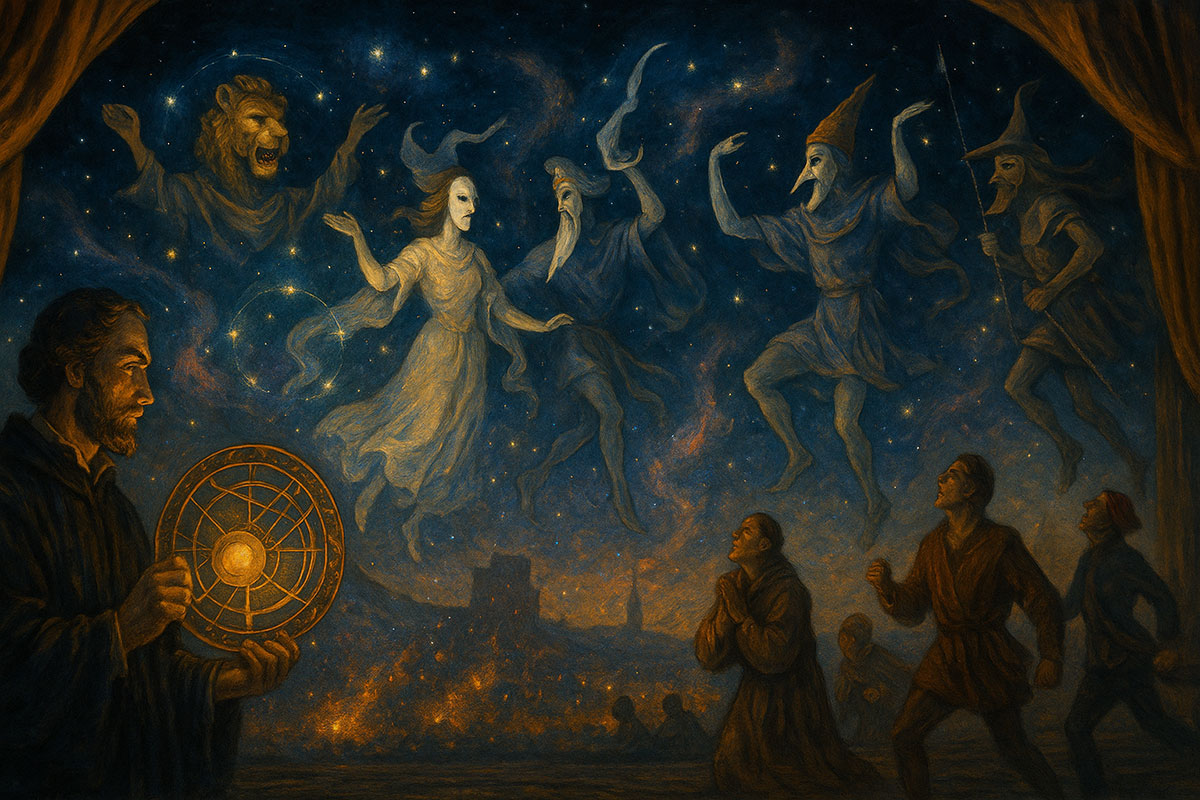
Moderator: William Shakespeare
Shakespeare — Gentle philosophers, astronomers, and poets, I would craft a play where heaven itself becomes stage, where men look up and see their fates written in fire. Tell me: how may I write a masque of stars that dazzles with wonder, yet roots itself in the beating hearts of mortals?
Question the First
Are the stars destiny, binding man in iron law, or are they symbols, teaching us to choose more wisely?
Ptolemy — The stars govern, as sure as tides obey the moon. A king is crowned beneath one constellation, a beggar born under another. Write the firmament as judge: men struggle, yet cannot flee the zodiac’s decree.
Copernicus — The stars are not masters, but companions. They do not bind us, they reveal our place in a vast harmony. Show the wonder of man small beneath infinite spheres, yet noble in reason to perceive them.
Giordano Bruno — The stars are infinite worlds, each with their own souls. Destiny is no prison; it is expansion. Your stage must burst its walls, showing endless heavens, so the audience feels awe and liberation, not chains.
John Dee — The stars are letters in God’s cipher. They instruct, but they do not enslave. Portray them as riddles to be read — some men read true, others in folly. The drama lies in the misreading.
Edmund Spenser — Stars are emblems, noble metaphors. They mirror our quests: Orion as knight, Venus as maiden. Use their imagery to guide allegory — the heavens teaching morals through story.
Shakespeare — Then my stage shall show both chain and crown: stars binding, stars liberating, stars as cipher, stars as song.
Question the Second
Wonder — how do I make the audience gaze upward, not at painted cloth, but with true awe in their breast?
Bruno — Break the ceiling of the stage. Let the players speak of infinity, until the pit itself feels dizzy with vastness. Use language that stretches thought like wings.
Spenser — Clothe the scene in allegory. Knights of the zodiac, maidens of the planets, a masque where every star is a dancer. Awe comes not from astronomy alone, but from poetry that makes the heavens human.
Copernicus — Simplicity moves most. A lantern swung in darkness may teach more awe than a pageant of gold. Show the earth itself moving, humble yet majestic. The audience will feel their footing slip — and wonder awakens.
John Dee — Use instruments: astrolabes, globes, charts. Let the scholar on stage measure heaven, so the pit feels the weight of knowledge. Mystery mingles with awe when men see order behind spectacle.
Ptolemy — Let prophecy seal it. Awe is deepest when men believe their own lives written above. A character who sees his fate in a constellation — and finds it true — will make the groundlings tremble.
Shakespeare — Then awe shall come by dance, by prophecy, by globe and lantern, by poetry and infinity. The stars shall shine in language as well as light.
Question the Third
When the masque ends, how shall man stand beneath the stars — humble servant, bold reader, or partner in their music?
Copernicus — Partner. He who knows the spheres joins their harmony. End with man listening, then singing with the heavens, a fellow in the cosmic choir.
Ptolemy — Servant. Stars are masters. End with man kneeling, his destiny sealed, the heavens immovable above.
Bruno — Explorer. End with man striding forth, daring to claim the stars as his brothers, infinite worlds awaiting his embrace.
John Dee — Reader. End with man holding an astrolabe, aware he deciphers only fragments. Humility in knowledge, not despair — the quest continues.
Spenser — Pilgrim. End with man walking upward, guided by allegory: a knight among constellations, love and virtue his compass.
Shakespeare — Then so it shall be: man as servant, partner, reader, explorer, and pilgrim. The stage shall close with voices braided, showing humanity as all these at once.
Final Thoughts

When I laid down my quill, many thought my stage complete. Yet plays are not bound to one lifetime. They are seeds scattered in the soil of imagination, awaiting their season to bloom.
These ten tales — of Troy and Carthage, of queens and conquerors, of merchants, sorcerers, lovers, and stars — are not lost, nor finished. They dwell in the unwritten pages of tomorrow, calling to me as surely as any muse.
Think not that I am done. The widow of Constantinople still waits for her bread, the Philosopher King still scratches wisdom by candlelight, Mary of Scots still walks her prison chamber with letters in hand. Troy’s ashes still smolder, Cairo’s courts still weigh coin against mercy, and the sorcerer of Samarkand still raises his staff under foreign skies. The Nile whispers her secret daughter, Carthage burns yet again, Verona feasts in uneasy peace, and above them all, the stars rehearse their masque.
These are not echoes of the past, but promises of the future. My hand shall find them, whether in your age or mine, whether by mortal quill or eternal breath. When the curtain rises again, you shall see them full-born upon the stage.
The quill yet stirs though centuries divide,
Ten plays shall rise when Time swings wide.
Short Bios:
William Shakespeare — English playwright and poet (1564–1616), widely regarded as the greatest writer in the English language, whose works blend history, tragedy, comedy, and poetry into timeless explorations of human nature.
Edward Gibbon — English historian (1737–1794), best known for The History of the Decline and Fall of the Roman Empire, offering sweeping insights into the causes of civilizational collapse.
Anna Komnene — Byzantine princess and historian (1083–1153), author of The Alexiad, a detailed chronicle of her father’s reign and the Byzantine world, rich with politics and culture.
Mehmed II (“the Conqueror”) — Ottoman sultan (1432–1481) who captured Constantinople in 1453, ending the Byzantine Empire and establishing Istanbul as the Ottoman capital.
Geoffrey of Monmouth — 12th-century cleric and chronicler, author of Historia Regum Britanniae, which popularized the legends of King Arthur and wove myth with history.
Christopher Marlowe — English dramatist and poet (1564–1593), Shakespeare’s contemporary, known for bold plays like Tamburlaine and Doctor Faustus, exploring ambition and the human condition.
Marcus Aurelius — Roman emperor and Stoic philosopher (121–180 CE), author of Meditations, reflecting on duty, virtue, and the struggles of leadership.
Seneca — Roman statesman and Stoic philosopher (c. 4 BCE–65 CE), tutor to Nero, whose essays and tragedies explore ethics, power, and the nature of self-control.
Plutarch — Greek biographer and essayist (c. 46–120 CE), author of Parallel Lives, a key source for Shakespeare’s Roman plays, offering moral lessons through biography.
Michel de Montaigne — French Renaissance philosopher (1533–1592), creator of the modern essay, who explored doubt, skepticism, and the complexity of human behavior.
Thomas More — English statesman, humanist, and martyr (1478–1535), author of Utopia, remembered for his moral conviction and tragic conflict with political power.
Mary, Queen of Scots — Scottish queen (1542–1587), whose turbulent reign was marked by political intrigue, tragic marriages, imprisonment, and execution under Elizabeth I.
George Buchanan — Scottish historian, scholar, and tutor to Mary, Queen of Scots (1506–1582), known for his sharp criticism of monarchy and eloquent Latin writings.
John Knox — Scottish reformer (1514–1572), fiery preacher and founder of the Presbyterian Church of Scotland, staunch opponent of Mary’s rule.
William Cecil, Lord Burghley — English statesman (1520–1598), chief advisor to Elizabeth I, master of political strategy, and a shaper of Elizabethan England.
Raphael Holinshed — 16th-century English chronicler, compiler of Holinshed’s Chronicles, a vital source of historical material for many of Shakespeare’s plays.
Homer — Ancient Greek poet, traditionally credited with composing The Iliad and The Odyssey, epic poems foundational to Western literature.
Virgil — Roman poet (70–19 BCE), author of The Aeneid, which linked Rome’s origins to Troy and celebrated destiny and empire.
Euripides — Greek tragedian (c. 480–406 BCE), known for plays like Medea and The Trojan Women, which foreground human suffering and the voices of women.
Geoffrey Chaucer — English poet (c. 1340s–1400), author of The Canterbury Tales, blending humor, irony, and deep insight into human behavior.
George Chapman — English poet, dramatist, and translator (1559–1634), renowned for his translations of Homer’s works, bringing epic grandeur to Elizabethan readers.
Ibn Khaldun — North African historian and philosopher (1332–1406), author of the Muqaddimah, exploring the rise and fall of civilizations and the social laws of history.
Herodotus — Ancient Greek historian (c. 484–425 BCE), known as the “Father of History,” author of Histories, blending fact, myth, and cultural observation.
Marco Polo — Venetian merchant and explorer (1254–1324), whose travels across Asia, recorded in The Travels of Marco Polo, introduced Europeans to distant lands.
Leo Africanus — North African diplomat and traveler (c. 1494–c. 1554), author of The Description of Africa, one of the most detailed accounts of the continent in Renaissance Europe.
William Camden — English historian and antiquarian (1551–1623), author of Britannia, a landmark study of British history and geography, admired by Shakespeare’s contemporaries.

Leave a Reply